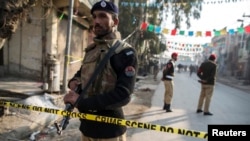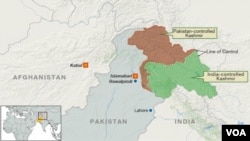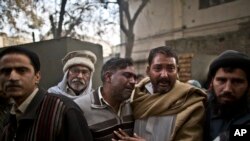Officials in northern Pakistan say a suicide bomber has struck a market near the country's military headquarters, killing at least 13 people.
The Taliban claimed responsibility for the attack Monday in Rawalpindi, not far from the capital, Islamabad. The blast, which wounded 18 people, went off in an area considered one of the most secure in the city.
Police officials said the dead included at least five soldiers.
On Sunday, the Taliban said it was behind a deadly suicide bombing that targeted a military convoy in the town of Bannu. That blast killed at least 20 Pakistani soldiers, and a Taliban spokesman warned the group would "carry out more such attacks in the future."
Meanwhile, the governor of Pakistan's Khyber Pakhtunkhaw province, worst hit by Taliban attacks, told VOA's Deewa Radio that if Taliban continued their attacks, the government would not be able to pursue a peace process with them.
"My view is that our culture and norms requires that killings and peace cannot go together. If you do not follow these norms and do not give opportunity to peace, it will not be possible to achieve peace," he said.
Despite the Pakistan government's efforts to reach out to the Taliban for peace talks, there has been no letup in attacks on civilians and security forces by the Pakistani Taliban.
The Taliban has conducted a bloody insurgency against the Pakistani state since 2007. The bombing Sunday was the biggest against Pakistani security forces in months.
Prime Minister Nawaz Sharif condemned Sunday's bombing and canceled his trip to this week's World Economic Forum in Davos, Switzerland.
The Taliban claimed responsibility for the attack Monday in Rawalpindi, not far from the capital, Islamabad. The blast, which wounded 18 people, went off in an area considered one of the most secure in the city.
Police officials said the dead included at least five soldiers.
On Sunday, the Taliban said it was behind a deadly suicide bombing that targeted a military convoy in the town of Bannu. That blast killed at least 20 Pakistani soldiers, and a Taliban spokesman warned the group would "carry out more such attacks in the future."
Meanwhile, the governor of Pakistan's Khyber Pakhtunkhaw province, worst hit by Taliban attacks, told VOA's Deewa Radio that if Taliban continued their attacks, the government would not be able to pursue a peace process with them.
"My view is that our culture and norms requires that killings and peace cannot go together. If you do not follow these norms and do not give opportunity to peace, it will not be possible to achieve peace," he said.
Despite the Pakistan government's efforts to reach out to the Taliban for peace talks, there has been no letup in attacks on civilians and security forces by the Pakistani Taliban.
The Taliban has conducted a bloody insurgency against the Pakistani state since 2007. The bombing Sunday was the biggest against Pakistani security forces in months.
Prime Minister Nawaz Sharif condemned Sunday's bombing and canceled his trip to this week's World Economic Forum in Davos, Switzerland.







